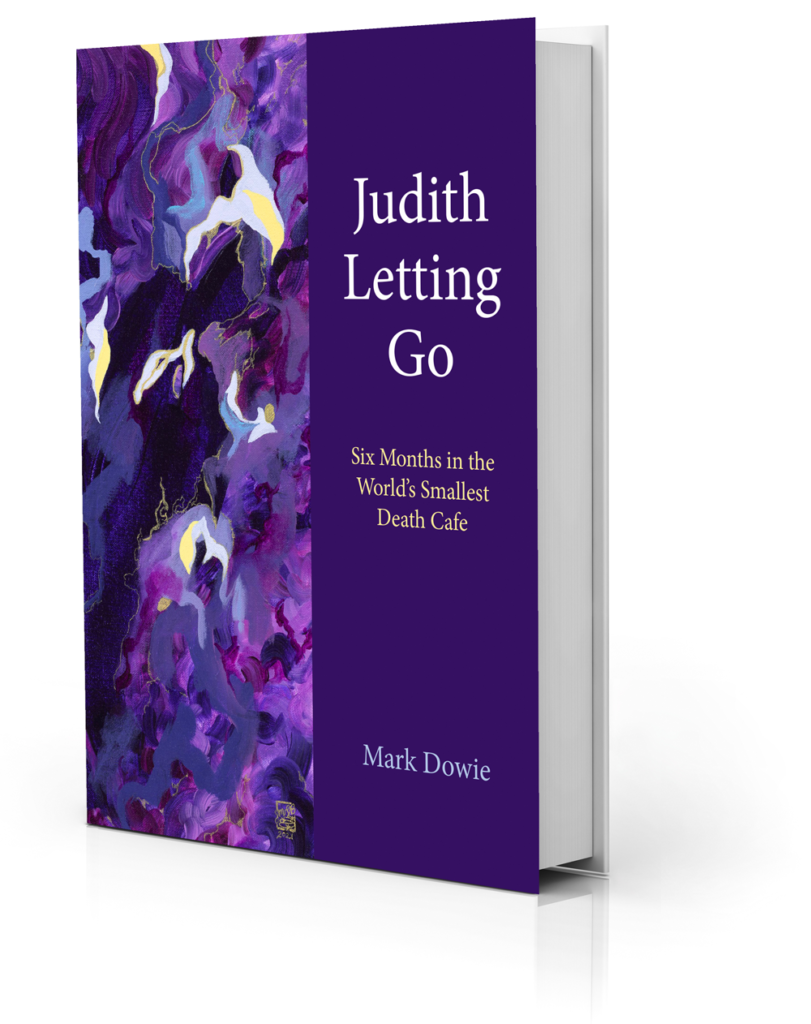Home > Resources > Mark Dowie | Judith Letting Go: Six Months in the World’s Smallest Death Café
Judith Letting Go: Six Months in the World’s Smallest Death Café
by Mark Dowie
Mark Dowie is the former publisher and editor of Mother Jones magazine, the founder of Talking Point Radio, and previous editor-at-large of InterNation, a features syndicate based in Paris. He recently retired from the U.C. Berkeley Graduate School of Journalism where he taught science, environmental reporting, and foreign correspondence. Dowie’s works have won 19 journalism awards, including four National Magazine Awards, a George Polk Award, a William Allen White Gold Medal, and a Media Alliance’s Meritorious Award for Lifetime Achievement. He was awarded a Doctor of Humane Letters by John F. Kennedy University. Dowie is the author of seven previous books.
Excerpt
Spoon
When we were together in her apartment, Judith was often lying flat on her back on the floor, almost always in pajamas. “It’s the only place I’m comfortable,” she said. One day the phone rang. She rose from her pain, cursed, and walked briskly over to the phone, mumbling something like “Another robo caller.” She picked up the receiver and said, “Hello.” Then she said, “Spoon,” followed by a long silence as she listened intently to the last words she would hear from a friend of thirty years.
Spoon Jackson, an African American man from a tiny desert town in Southern California, is serving a life-without-parole sentence in New Folsom prison. Judith had taught him the art of writing poetry. She “believed in me even when she didn’t know me,” Spoon wrote of Judith in a memoir they shared of their friendship. He knew her plan and was calling to say goodbye. I couldn’t hear what he said, but Judith was weeping as he offered his farewell. “I love you, too,” she said, and hung up, returning to her position on the floor, where she lay on her back in silence, staring at the ceiling until she was ready to move on. I said nothing.
Spoon was one of a dozen or more prison inmates, most of them lifers, to sign up for Judith’s poetry class, taught in the California Department of Corrections arts program at San Quentin. She was the first teacher in Spoon’s life who wasn’t wielding a paddle or length of garden hose with which to beat him. Through poetry, Judith revealed to Spoon a man who, he recalls, “did not believe that anything written by me was worthy, or anything inside was beautiful.” Spoon Jackson’s work is now published, and he is known throughout the California prison system as “the poet.” And he’s been nominated for poet laureate of California.
“I have been so incredibly lucky in my life,” Judith said wistfully after the call. “The work I’ve been able to do . . . being present, with others opening up and sharing as much deep, painful beauty as they could manage.”
All Judith seemed to want at that point was calm advice, simple human kindness, and a peaceful death. And that was really all I or anyone else could give her. But as we waited out the short time left till the end, she would give me so much more in return—a free course on dying. Death is the end of life, we know, but is it the end of existence? To a degree, I suppose it is . . . at least the existence of our bodies. But existence survives in memories, as Judith’s will in mine.
On another phone call I overheard, Judith announced her decision to the caller, then remained silent throughout the rest of the call, said goodbye, and hung up. “Who was that?” I asked. “An old friend I haven’t heard from in years. He cried and reminded me of a wonderful hike we took together years ago.” She paused for a moment, lay back down on the floor, gazed out the window, and pondered the call.
“So this is how it unfolds,” she said, sighing, “my whole life being given back to me in tiny chapters by friends who remember incidents I’d almost forgotten.” She stopped, raised her head from the floor, and said with noticeable remorse, “Of course I’m going to have to stop rerunning their stories, one at a time, as I face the finish line. I guess that’s part of letting go.” Then she chuckled and added, “But I’ll hold on to that one for a little while longer.”
On my way out the door that afternoon, Judith dropped what was for me a loaded question to think about before our next meeting. It’s one of the most frequently suggested meeting openers in Death Café advisory articles and instruction manuals.
“How do you want to be remembered?” she asked.
“Not too well,” I replied.
She grabbed my arm and stopped me.” What, exactly, do you mean by that?” she asked.
“Well, do you want to be remembered for everything you did?”
She paused for a moment, looked off to one side, and chuckled quietly.
“Good question,” she said, and let me go.
Truth is, it really doesn’t matter how I am remembered. I’ll never know. I’ve been good to some people, less so to others. That’s how I should and probably will be remembered; although fondly, I hope, by those I didn’t offend or hurt.
When this book is published, it will be my tenth. To that, add somewhere around two hundred investigative reports, a bunch of op-eds, and a few turgid essays. But they are my legacy, not me. And their content has nothing to do with who I have been as a person, or how I should be remembered. I suppose I’ll be remembered a thousand or more different ways, by the thousand or more people whose paths I’ve crossed.
Excerpted from Judith Letting Go: Six Months in the World’s Smallest Death Cafe. Copyright © 2024, Dowie, Mark. Reproduced by permission of New Village Press. All rights reserved.

